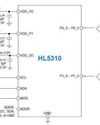
When a company like Nvidia invests heavily in the Industrial Internet of Things market like it has with the introduction of the Jetson brand of embedded processors, it turns a lot of people's heads. But will the company have the same type of impact it has had on industrial automation that it has on the datacenter universe by offering endless amounts of GPU horsepower to tackle the inferencing, machine language and computer vision applications installed on assembly lines? The smart money says eventually but it will take a while.
Nvidia has tried to demonstrate its commitment to the industrial embedded market and one of its goals is to revolutionize edge processing tasks for Artificial Intelligence in factories to make assembly lines more productive through improved quality control, predictive maintenance, autonomous vehicle operation and visual inspection among other things. Some industry watchers say generative AI is now gaining momentum in the industrial automation space.
But can you just imagine how Nvidia's overtures are going over with the people who operate assembly lines? Anecdotal evidence supports the theory that manufacturing technology adoption for industrial users occurs at a much slower pace than it does for datacenter users. Factory tech personnel eschew pie-in-the-sky productivity promises that leading-edge technology offers because they place more weight on safety, security, reliability and 24-hour uptime. New technology is often perceived as unnecessarily disruptive in a manufacturing environment, and it poses risk to the continuous flow of operations because it introduces challenges.
A deeper dive into the innovative technology that IIOT providers are promising for factories reveals some of the end-user benefits that may stir demand. Perhaps a small handful of industries will adopt the latest and greatest as soon as they are available, but every environment is different and so actual results may vary.
This story is from the {{IssueName}} edition of {{MagazineName}}.
Start your 7-day Magzter GOLD free trial to access thousands of curated premium stories, and 9,000+ magazines and newspapers.
Already a subscriber ? Sign In
This story is from the {{IssueName}} edition of {{MagazineName}}.
Start your 7-day Magzter GOLD free trial to access thousands of curated premium stories, and 9,000+ magazines and newspapers.
Already a subscriber? Sign In

Renesas New RA8 Entry-Line MCU Groups Brings High Performance of Arm Cortex-M85 Processor to Cost-Sensitive Applications with Market-Leading CoreMark Performance
Renesas Electronics Corp., a premier supplier of advanced semiconductor solutions, introduced the RA8E1 and RA8E2 microcontroller (MCU) groups, extending the industry's most powerful series of MCUs.

Same Sky Expands AMT Absolute Encoder Line to Support Larger Shaft Sizes
Same Sky's Motion & Control Group announced the addition of a new series to its innovative AMT absolute encoder family designed to support larger motor shaft sizes from 9mm to 15.875mm (5/8 inch).

XP Power Launches New Series of Low-Profile, Baseplate-Cooled DC-DC Brick Converters
The RDF150 and RDF200 series are the latest additions to the RDF series of low-profile, baseplate-cooled, ultra-wide input DC-DC brick converters, which is already available in power outputs of 25W and 50W.

HMI Introduces Ultra-Low Voltage 12-bit GPIO Expander with Interrupt Output
HMI, a leading provider of advanced analog and power management technologies, announced the launch of its HL5310, an innovative ultra-low voltage 12-bit GPIO expander featuring interrupt output.

The Future of Embedded Chip Design Navigating the Chip Creation Space
Custom Silicon at Lower Cost, Reduced Development Time

The Long and Winding Road
From Maxim's RS-232 to WeMos ESP32: So Much to Do, So Little Time

Start to Finish Driving LCDs
Lumex Display with Microchip Driver for a TI MCU

Easing the Path for App Releases
Managed Development of React Native with Expo

Datasheet: Tiny Embedded Boards
Deliver Power, Performance, and Versatility in Meager Square Millimeters

Harvesting Ambient Energy
Hybrid Power Sources Cut IoT Battery Dependency